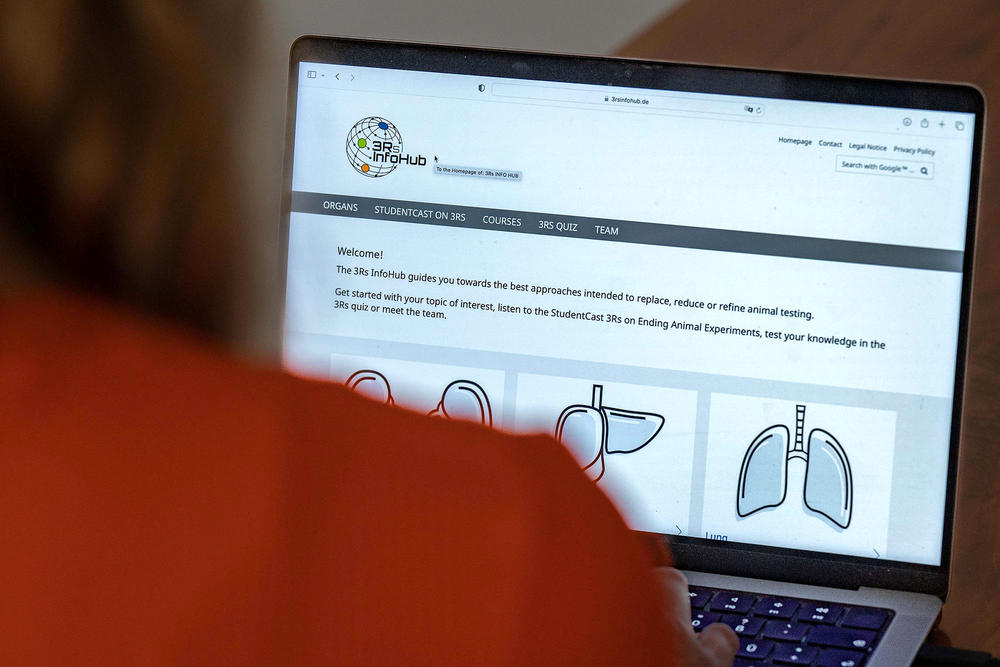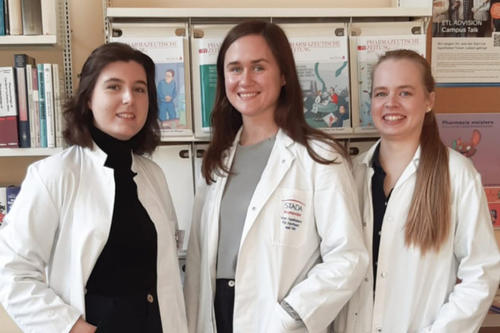“3Rs Info Hub” – A New Learning Platform for Research without Animals
Senior Researchers Dr. Vivian Kral and Dr. Christian Zoschke, along with a team of young researchers and students, developed an e-learning platform highlighting alternatives to animal research.
Nov 29, 2022
The learning platform “3Rs Info Hub” informs students and researchers about the best and newest 3R methods in the life sciences.
Image Credit: Bernd Wannenmacher
The learning platform is aimed at students, doctoral candidates, and interested scientists in the natural sciences, medicine, and veterinary medicine. The three “Rs” in the name stand for “replace, reduce, and refine” with regard to animal research. The British scientists William Russel and Rex Burch formulated these principles of biomedical research as early as 1959. The aim is to replace animal experiments, reduce the number of animals, or at least limit their suffering to the absolute minimum.
For a long time this approach remained more of a vision than reality. Thanks to new biotechnological and computer-based methods, research approaches that do justice to the 3R principle have increasingly been developed, especially in the past two decades.
Veterinarian Dr. Vivian Kral points out that it is very difficult to find good teaching material to integrate newly developed research approaches into science degree programs that are already brimming with required course work. She had the idea of collecting freely available explanatory videos from the Internet on a web platform and compiling them into meaningful learning units.
Learning Scenarios with Videos, Podcasts, and a Quiz
Three years ago, together with the pharmacist Dr. Christian Zoschke, Dr. Kral developed the concept for the English-language website “3Rs Info Hub.” It has four sections: a compact presentation of organ-specific alternative methods, a podcast series with students and scientists, carefully designed learning units, and interactive quizzes.
Dr. Kral explains, “On the 3Rs Info Hub, we bundle and structure the relevant and current 3R topics.” Instead of getting lost in thousands of search engine results, users can click through topic-related learning scenarios in three levels of difficulty. The scenarios consist of videos, podcast episodes, and a quiz to check learning.
Pharmacy students Melissa Hansjürgens, Rebecca Rosengrün, and Sarah Bednasch (from left to right) jointly produced podcast episodes for the learning platform.
Image Credit: Personal collection
Besides the veterinarian and the pharmacologist, the team includes other scientists with experience in web design and database creation. In addition, students helped in the extensive research of already available content and in creating new explanatory videos.
Interviews with Leading Experts
Pharmacy student Melissa Hansjürgens reports on working together as equals in the team. She said it was a positive experience to deal intensively with topics they had little time for during their regular studies.
A fellow student, Rebecca Rosengrün, said that without the project she would never have had the idea of making a podcast or an explanatory video, and now she knows how to do it. Along with Melissa Hansjürgens and Sarah Bednasch, she interviewed the biologist Dr. Jan Bruder from the Max Planck Institute for Molecular Biomedicine in Münster. Dr. Bruder grows three-dimensional tissue cultures, called organoids, from precursors of human brain cells, which can be used to test whether new active ingredients for medicines are ineffective or even toxic.
Melissa said it was not easy for her to talk with the biologist over the phone in English, so she put a lot of effort into preparing carefully for the interview. She said, “We read some of his articles and wrote down our questions about them.” Rebecca edited the recording, which can now be heard on the website, as well as on Spotify, Apple Podcasts, and Google Podcasts.
The Best 3R Methods for the Life Sciences
Other episodes deal with, for example, bio-prints from the 3D printer, models of human organs, and test strategies for evaluating allergy-causing substances.
Dr. Kral points out that there are already established alternative methods to animal experiments for many research questions. However, it is a challenge to get them established and to gain regulatory recognition of alternative methods. For example, reviewers of scientific publications still often call for animal testing as the gold standard. With the 3Rs Info Hub, Dr. Kral, Dr. Zoschke, and their team hope to reach not only students, but all researchers in the life sciences and provide them with scientifically sound information.
The platform has already met with great interest nationally and internationally. Now it is important to continuously further develop the project in order to continue to provide information about the best and newest 3R methods in the future. Dr. Kral is confident that they will succeed. She says that in her experience, many people prefer to avoid animal testing if it is at all possible.
This article originally appeared in German on October 28, 2022, in campus.leben, the online magazine of Freie Universität Berlin.
Further Information
- Learning platform: 3Rs Info Hub
- Podcast Series: „StudentCast on 3Rs – Tierschutz trifft Wissenschaft“ (in German and English)


